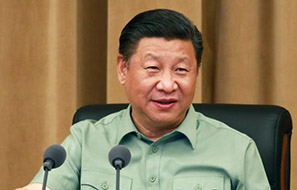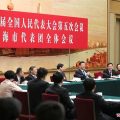
习近平视察海军机关
5月24日,中共中央总书记、国家主席、中央军委主席习近平视察海军机关,亲切接见海军第十二次党代会全体代表和海军机关正师职以上领导干部。这是习近平听取海军工作汇报后发表重要讲话。
新华社记者 查春明 摄
President heads new commission bringing contractors into the fold
China has made substantial progress with its efforts to boost civil-military integration, as a top body in charge of the issue takes shape.
President Xi Jinping led the first plenary session of the Central Commission for Integrated Military and Civilian Development in Beijing on Tuesday. Xi also is chairman of the Central Military Commission, the nation’s highest military ruling body.
The session reviewed and passed the codes of conduct for the commission and its standing office, a plan for the commission’s work in the near future as well as a set of guidelines for the establishment of local departments overseeing civil-military integration affairs.
The move indicates the commission and its standing office are able to execute their responsibilities after spending the past several months on organizing themselves.
In China, civil-military integration generally refers to the military and defense industry transferring technologies to civilian sectors, including private companies in the military’s suppliers list. So far, State-owned defense contractors still dominate the research, development and production of weapons and equipment of the People’s Liberation Army.
Among key areas involved are defense, infrastructure construction, personnel training, new energy, aerospace and the internet.
In late January, the Political Bureau of the Communist Party of China Central Committee set up the commission with Xi as its head. It was the first time the top leadership had established a dedicated body on civil-military integration.
Li Keqiang, Liu Yunshan and Zhang Gaoli, all members of the Standing Committee of the Political Bureau of the CPC Central Committee and deputy heads of the commission, also attended the meeting.
At the meeting, Xi urged government departments and military authorities to spare no efforts to boost civil-military integration.
It is a major decision concerning national development and overall security, and a major measure to deal with complicated security threats and gain national strategic advantages, Xi said.
He pledged to open more space in the defense sector to private enterprises and break vested interests, saying obstacles to private companies’ participation must be removed.
Xi, in his capacity as the chairman of the Central Military Commission, has repeatedly stressed the significance of civil-military integration.
In March, he told military deputies to the national legislature that the PLA must take advantage of China’s achievements in science and technology to help modernize its weapons and equipment.


